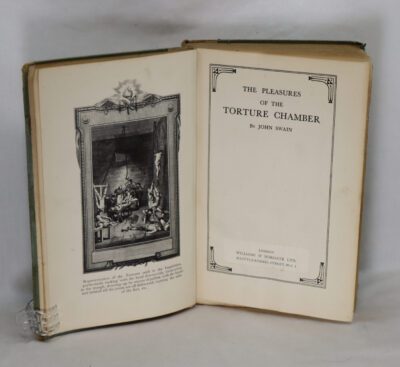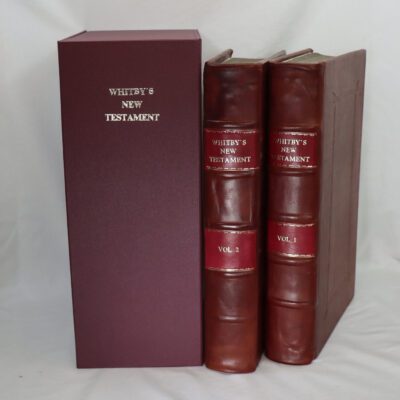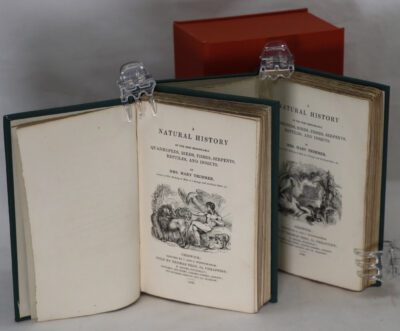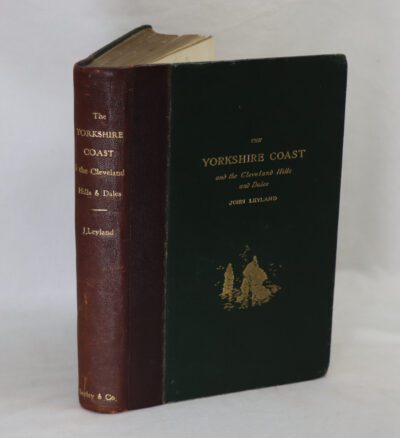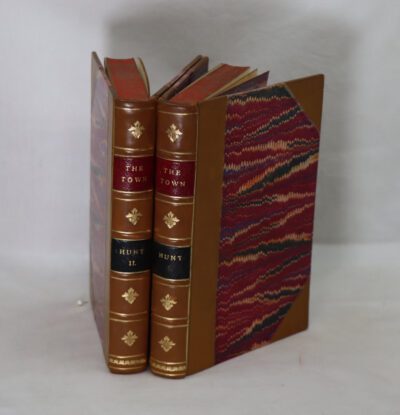The Tribulations of a Chinaman.
By Jules Verne
Printed: 1880
Publisher: Sampson Low Marston & Rivington. London
Edition: First edition
| Dimensions | 15 × 19 × 4 cm |
|---|---|
| Language |
Language: English
Size (cminches): 15 x 19 x 4
Condition: Very good (See explanation of ratings)
FREE shipping
Item information
Description
Blue cloth binding. Gilt title with black image of figures lying on the waves with sails.
-
F.B.A. provides an in-depth photographic presentation of this item to stimulate your feeling and touch. More traditional book descriptions are immediately available.
First full UK translation. An increasingly rare book in good condition. Tribulations of a Chinaman in China (French: Les Tribulations d’un Chinois en Chine) is an adventure novel by Jules Verne, first published in 1879. The story is about a rich Chinese man, Kin-Fo, who is bored with life, and after some business misfortune decides to die.
Somewhat of a bizarre book but one with a happy ending.
Illustration from the French Edition.
The book is a traditional adventure, similar in style to Around the World in Eighty Days, one of the author’s better-known books. However, it does contain more humour as well as criticism of topics such as the British opium trade in China. An English translation was serialized in The Leisure Hour in 1880, much of this translation forms the basis of this book.
The Leisure Hour was a British general-interest periodical of the Victorian era which ran weekly from 1852 to 1905. It was the most successful of several popular magazines published by the Religious Tract Society, which produced Christian literature for a wide audience. Each issue mixed multiple genres of fiction and factual stories, historical and topical. The magazine’s title referred to campaigns that had decreased work hours, giving workers extra leisure time. Until 1876, it carried the subtitle “A Family Journal of Instruction and Recreation”; after that, the subtitle changed to “An illustrated magazine for home reading”. Each issue cost one penny and contained 16 pages. The layout typically included approximately six long articles, formatted in two columns per page, and five or six illustrations. The articles were a mix, including biographies, poetry, essays, and fiction. Each issue usually started with a piece of serialised fiction.
The creation of the magazine was partly a response to non-religious popular magazines that the Religious Tract Society saw as delivering a “pernicious” morality to the working classes. The ethos of the magazine was guided by Sabbatarianism: the campaign to keep Sunday as a day of rest. It aimed to treat its diverse subjects “in the light of Christian truth”. Despite this, The Leisure Hour carried far fewer statements of Christian doctrine than the Society’s other publications. Compared to other popular magazines of the time, The Leisure Hour had a greater emphasis on fiction.
Two days before the magazine’s launch in 1852, a warehouse fire destroyed the first batch of The Leisure Hour, so replacement copies had to be printed. The magazine was edited by William Haig Miller until 1858, James Macaulay from 1858 to 1895, and William Stevens from 1895 to 1900. Harold Copping was one of its illustrators. Authors were initially only credited by initials rather than by name, giving the writing a collective rather than individual authority, though naming of authors became more common from the 1870s onwards. In its jubilee issue, published in 1902, the magazine identified 111 authors who had contributed.
Jules Gabriel Verne (8 February 1828 – 24 March 1905)[was a French novelist, poet, and playwright. His collaboration with the publisher Pierre-Jules Hetzel led to the creation of the Voyages extraordinaires, a series of bestselling adventure novels including Journey to the Center of the Earth (1864), Twenty Thousand Leagues Under the Seas (1870), and Around the World in Eighty Days (1872). His novels, always well documented, are generally set in the second half of the 19th century, taking into account the technological advances of the time.
In addition to his novels, he wrote numerous plays, short stories, autobiographical accounts, poetry, songs, and scientific, artistic, and literary studies. His work has been adapted for film and television since the beginning of cinema, as well as for comic books, theater, opera, music and video games.
Verne is considered to be an important author in France and most of Europe, where he has had a wide influence on the literary avant-garde and on surrealism. His reputation was markedly different in the Anglosphere where he had often been labeled a writer of genre fiction or children’s books, largely because of the highly abridged and altered translations in which his novels have often been printed. Since the 1980s, his literary reputation has improved.
Jules Verne has been the second most-translated author in the world since 1979, ranking below Agatha Christie and above William Shakespeare. He has sometimes been called the “father of science fiction”, a title that has also been given to H. G. Wells and Hugo Gernsback. In the 2010s, he was the most translated French author in the world. In France, 2005 was declared “Jules Verne Year” on the occasion of the centenary of the writer’s death.
Want to know more about this item?

Related products
Share this Page with a friend





